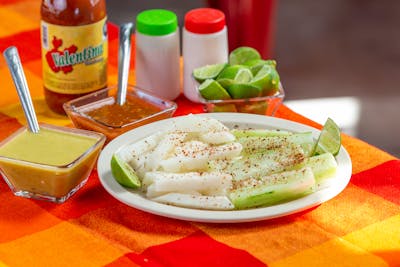In the vast landscape of nutritious foods, certain staples like kale, avocado, and berries often take center stage. However, there’s a lesser-known vegetable that boasts an impressive nutritional profile and a range of health benefits—jicama. Also known as the Mexican turnip or yam bean, jicama is a root vegetable that deserves more attention for its unique flavor and substantial health contributions.

What is Jicama?
Jicama (Pachyrhizus erosus) is a tuberous root native to Mexico and Central America. It has a thick, brown skin and a crisp, white interior. Jicama is commonly eaten raw, offering a sweet, nutty flavor and a texture similar to a cross between an apple and a water chestnut. This versatile vegetable can be used in salads, slaws, and various other dishes.
Nutritional Profile of Jicama
Jicama is a nutritional powerhouse packed with essential vitamins, minerals, and other beneficial compounds:
- Dietary Fiber: Jicama is an excellent source of dietary fiber, which supports digestive health, helps maintain stable blood sugar levels, and promotes a feeling of fullness.
- Vitamin C: High in vitamin C, jicama boosts immune function, promotes healthy skin, and acts as an antioxidant to protect the body from free radicals.
- Potassium: This mineral is crucial for maintaining proper muscle function and regulating blood pressure.
- Inulin: Jicama contains inulin, a prebiotic fiber that supports the growth of beneficial gut bacteria, aiding in overall digestive health.
Health Benefits of Jicama
Incorporating jicama into your diet can offer several health benefits:
- Promotes Digestive Health: The high fiber content in jicama supports regular bowel movements and helps prevent constipation.
- Boosts Immune System: The vitamin C in jicama enhances immune function, helping the body fend off infections and illnesses.
- Supports Heart Health: Potassium in jicama helps regulate blood pressure, reducing the risk of hypertension and cardiovascular diseases.
- Aids in Weight Management: The fiber in jicama promotes satiety, helping you feel full longer and potentially reducing overall calorie intake.
- Enhances Skin Health: The antioxidant properties of vitamin C in jicama contribute to healthy, glowing skin by protecting against oxidative stress and supporting collagen production.
How to Incorporate Jicama into Your Diet
Jicama can be enjoyed in various ways, adding a delightful crunch and subtle sweetness to your meals. Here are some ideas:
- Raw Jicama Sticks: Cut jicama into sticks and enjoy them as a healthy snack, either plain or with a dip like hummus or guacamole.
- Jicama Salad: Add thinly sliced jicama to salads for an extra crunch. It pairs well with citrus fruits, avocado, and leafy greens.
- Jicama Slaw: Create a refreshing slaw by mixing shredded jicama with cabbage, carrots, and a tangy vinaigrette.
- Stir-Fry: Add jicama to stir-fries for a crunchy texture. It absorbs flavors well and complements a variety of vegetables and proteins.
- Tacos: Use jicama slices as a crunchy topping for tacos, adding a fresh and nutritious element to your dish.
Conclusion
Jicama is an underrated vegetable that offers a myriad of health benefits, making it a valuable addition to any diet. Its high fiber content, rich vitamin and mineral profile, and prebiotic properties contribute to overall health and well-being. By incorporating jicama into your meals, you can enjoy its unique taste and texture while reaping the numerous health benefits it provides. As more people discover this versatile root vegetable, jicama has the potential to become a beloved staple in kitchens around the world.

